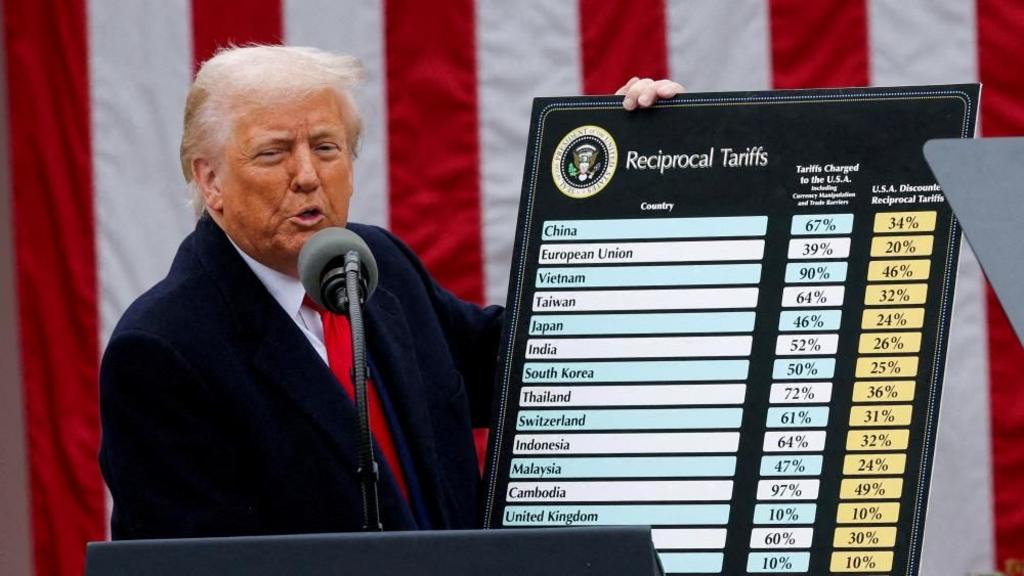Court strikes down Trump’s blanket tariffs on imports, says he overstepped his powers

In a landmark decision, the Court of International Trade said Congress, not the president, has the sole authority to regulate trade with other countries unless specifically permitted by law.
A US trade court has stopped President Donald Trump's sweeping tariffs on imported goods, ruling that he overstepped his powers by imposing the duties without proper legal basis.
In a landmark decision, the Court of International Trade said Congress, not the president, has the sole authority to regulate trade with other countries unless specifically permitted by law.
In a unanimous ruling, the three-judge panel issued a permanent injunction against all tariff orders made by Trump since January under the International Emergency Economic Powers Act (IEEPA).
The court said the law does not allow a president to use emergency powers for general trade purposes.
"The court does not pass upon the wisdom or likely effectiveness of the President's use of tariffs as leverage," the judges wrote. "That use is impermissible not because it is unwise or ineffective, but because [federal law] does not allow it."
The court ordered the Trump administration to revise its orders within 10 days. In response, the administration quickly filed a notice of appeal and questioned the court’s authority.
The decision takes immediate effect and invalidates all Trump tariffs based on the IEEPA.
It does not affect industry-specific tariffs, such as those on steel, aluminum, or cars, which were issued under different legal grounds.
The Manhattan-based court’s rulings can be appealed to the US Court of Appeals for the Federal Circuit in Washington and possibly the Supreme Court.
Trump has relied heavily on tariffs in his trade strategy, using them as a tool to pressure other countries into new trade deals. His actions have disrupted global trade and affected businesses across the US.
Many companies have struggled to keep up with the sudden shifts in tariffs, impacting their operations, supply chains, and pricing.
Businesses welcomed the court's ruling. It came in two lawsuits—one by 12 US states and another by the Liberty Justice Center on behalf of five small businesses.
The firms, ranging from a New York wine importer to a Virginia company making educational kits, said the tariffs threatened their survival.
"There is no question here of narrowly tailored relief; if the challenged Tariff Orders are unlawful as to Plaintiffs, they are unlawful as to all," the judges wrote.
Oregon Attorney General Dan Rayfield, whose office led the states’ case, called the ruling a clear message that trade decisions must follow the law. "This ruling reaffirms that our laws matter, and that trade decisions can’t be made on the president’s whim," he said.
Trump had declared the US trade deficit a national emergency in April and used that as justification for tariffs of 10% or more on nearly all imports, especially from countries like China.
Many of the higher tariffs were paused a week later as talks resumed. In May, both the US and China agreed to lower tariffs on each other for 90 days while working toward a broader deal.
A White House spokesperson defended the president’s move.
"U.S. trade deficits with other countries constituted a national emergency that has decimated American communities, left our workers behind, and weakened our defense industrial base – facts that the court did not dispute. It is not for unelected judges to decide how to properly address a national emergency, Kush Desai said.
Despite the government’s objection, financial markets responded positively. The dollar surged against major global currencies, while Wall Street futures and Asian markets also rose.
But the ruling adds uncertainty to Trump’s ongoing negotiations with countries like China and the European Union, raising questions about how the administration will pursue its trade goals without the leverage of blanket tariffs.
Trump has claimed that the tariffs would help bring back manufacturing jobs and reduce the country’s $1.2 trillion trade deficit. Without the tariffs, his administration may need new strategies for trade talks.
Five more legal cases against the tariffs are still pending. Trump remains the first president to use the IEEPA for broad tariff measures, a move now facing serious legal challenges.
